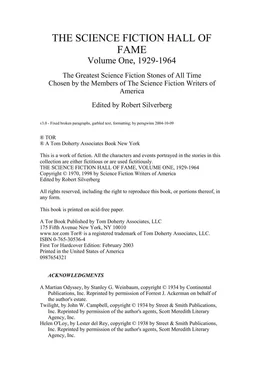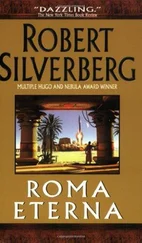I am in—Nee-vah-dah—as you would say? We say only Neva. And Yawk State. But it is Ohio and Iowa still. Over a thousand years, effects were small on words, because they were recorded.
But seven million years had passed, and the men had forgotten the old records, used them less as time went on, and their speech varied till the time came when they could no longer understand the records. They were not written any more, of course.
Some men must have arisen occasionally among that last of the race and sought for knowledge, but it was denied them. An ancient writing can be translated if some basic rule is found. An ancient voice though— and when the race has forgotten the laws of science and the labor of mind.
So his speech was strange to me as he answered over that circuit. His voice was high in pitch, his words liquid, his tones sweet. It was almost a song as he spoke. He was excited and called others. I could not understand them, but I knew where they were. I could go to them.
So I went down from the paradise of gardens, and as I prepared to leave, I saw dawn in the sky. The strange-bright stars winked and twinkled and faded. Only one bright rising star was familiar—Venus. She shone golden now. Finally, as I stood watching for the first time that strange heaven, I began to understand what had first impressed me with the wrongness of the view. The stars, you see, were all different.
In my time—and yours, the solar system is a lone wanderer that by chance is passing across an intersection point of Galactic traffic. The stars we see at night are the stars of moving clusters, you know. In fact our system is passing through the heart of the Ursa Major group. Half a dozen other groups center within five hundred light-years of us.
But during those seven millions of years, the Sun had moved out of the group.
The heavens were almost empty to the eye. Only here and there shone a single faint star. And across the vast sweep of black sky swung the band of the Milky Way. The sky was empty.
That must have been another thing those men meant in their songs— felt in their hearts. Loneliness—not even the close, friendly stars. We have stars within half a dozen light-years. They told me that their instruments, which gave directly the distance to any star, showed that the nearest was one hundred and fifty light-years away. It was enormously bright. Brighter even than Sinus of our heavens. And that made it even less friendly, because it was a blue-white supergiant. Our sun would have served as a satellite for that star.
I stood there and watched the lingering rose-silver glow die as the powerful blood-red light of the Sun swept over the horizon. I knew by the stars now, that it must have been several millions of years since my day; since I had last seen the Sun sweep up. And that blood-red light made me wonder if the Sun itself was dying.
An edge of it appeared, blood-red and huge. It swung up, and the color faded, till in half an hour it was the familiar yellow-gold disk.
It hadn't changed in all that time.
I had been foolish to think that it would. Seven million years—that is nothing to Earth, how much less to the Sun? Some two thousand thousand thousand times it had risen since I last saw it rise. Two thousand thousand thousand days. If it had been that many years—I might have noticed a change.
The universe moves slowly. Only life is not enduring; only life changes swiftly.
Eight short millions of years. Eight days in the life of Earth—and the race was dying.
It had left something: machines. But they would die, too, even though they could not understand. So I felt. I—may have changed that. I will tell you. Later.
For when the Sun was up, I looked again at the sky and the ground, some fifty floors below. I had come to the edge of the city.
Machines were moving on that ground, leveling it, perhaps. A great wide line of gray stretched off across the level desert straight to the east. I had seen it glowing faintly before the Sun rose—a roadway for ground machines. There was no traffic on it.
I saw an airship slip in from the east. It came with a soft, muttering whine of air, like a child complaining in sleep, it grew to my eyes like an expanding ballon. It was huge when it settled in a great port-slip in the city below. I could hear now the clang and mutter of machines, working on the materials brought in, no doubt. The machines had ordered raw materials. The machines in other cities had supplied. The freight machines had carried them here.
San Frisco and Jacksville were the only two cities on North America still used.
But the machines went on in all the others, because they couldn't stop. They hadn't been ordered to.
Then high above, something appeared, and from the city beneath me, from a center section, three small spheres rose. They, like the freight ship, had no visible driving mechanisms. The point in the sky above, like a black star in a blue space, had grown to a moon. The three spheres met it high above. Then together they descended and lowered into the center of the city, where I could not see them.
It was a freight transport from Venus. The one I had seen land the night before had come from Mars, I learned.
I moved after that and looked for some sort of a taxi-plane. They had none that I recognized in scouting about the city. I searched the higher levels, and here and there saw deserted ships, but far too large for me, and without controls.
It was nearly noon—and I ate again. The food was good.
I knew then that this was a city of the dead ashes of human hopes. The hopes not of a race, not the whites, nor the yellow, nor the blacks, but the human race. I was mad to leave the city. I was afraid to try the ground road to the west, for the taxi I drove was powered from some source in the city, and I knew it would fail before many miles.
It was afternoon when I found a small hangar near the outer wall of the vast city.
It contained three ships. I had been searching through the lower strata of the human section—the upper part. There were restaurants and shops and theatres there. I entered one place where, at my entrance, soft music began, and colors and forms began to rise on a screen before me.
They were the triumph songs in form and sound and color of a mature race, a race that had marched steadily upward through five millions of years—and didn't see the path that faded out ahead, when they were dead and had stopped, and the city itself was dead—but hadn't stopped. I hastened out of there—and the song that had not been sung in three hundred thousand years died behind me.
But I found the hangar. It was a private one, likely. Three ships. One must have been fifty feet long and fifteen in diameter. It was a yacht, a space yacht, probably.
One was some fifteen feet long and five feet in diameter. That must have been the family air machine. The third was a tiny thing, little more than ten feet long and two in diameter. I had to lie down within it, evidently.
There was a periscopic device that gave me a view ahead and almost directly above. A window that permitted me to see what lay below— and a device that moved a map under a frosted-glass screen and projected it onto the screen in such a way that the cross-hairs of the screen always marked my position.
I spent half an hour attempting to understand what the makers of that ship had made. But the men who made that were men who held behind them the science and knowledge of five millions of years and the perfect machines of those ages. I saw the release mechanism that powered it. I understood the principles of that and, vaguely, the mechanics. But there were no conductors, only pale beams that pulsed so swiftly you could hardly catch the pulsations from the corner of the eye. They had been glowing and pulsating, some half dozen of them, for three hundred thousand years at least; probably more.
Читать дальше












